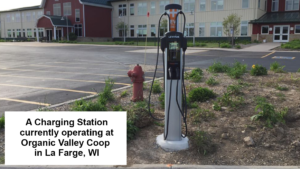
If We Want To Reduce Nitrogen Oxide Emissions Today, Don’t Buy Electric Vehicle Charging Stations
Use the one-time money from the Volkswagen cheating scandal to actually reduce NOx now
Let the electric car and truck industry sink or swim on its own – the government should stay on the sidelines
Later today, the Assembly Committee on Energy and Utilities will hold a hearing on Assembly Bill 233, a bill that would direct the Public Service Commission (PSC) to award $10 million to help private businesses purchase, install and maintain an electric vehicle charging facility.
The $10 million is part of Wisconsin’s $67 million share of the Volkswagen (VW) emissions scandal settlement. Back in 2015, the Environmental Protection Agency (EPA) discovered that VW had installed software illegally in its diesel cars that improved emissions performance only when the car was being tested. All told, VW paid $2.9 billion into a Environmental Mitigation Trust Fund to help reduce the Nitrogen Oxide (NOx) pollution here in the United States that was emitted by their cheating cars.
The idea behind the mitigation fund is that VW’s cars emitted extra NOx above legal levels and VW should pay for projects and strategies that will reduce NOx emissions.
Wisconsin’s Department of Administration (DOA) produced the Wisconsin Beneficiary Mitigation Plan for the Volkswagen Environmental Mitigation Trust last year to outline how Wisconsin plans to use the VW settlement money “to reduce NOx emissions in Wisconsin.”
The problem is, there are much better and more cost effective ways to reduce NOx in the short term than helping private businesses to purchase electric vehicle charging stations.
Helping private businesses purchase electric vehicle charging stations will not actually lower NOx emissions any time soon.
The idea behind the legislation is more electric vehicle charging stations around the state would supposedly convince more people to actually purchase an electric vehicle and more electric vehicles would lower NOx emissions. It’s a stretch to say that the number of charging stations in an area would be a deciding factor for most people when they make this decision. The actual cost of an electric vehicle, the size of the electric vehicle government subsidy, reliability and safety are more common concerns that will determine what type of car someone buys.
Helping private businesses purchase electric vehicle charging stations will not actually lower NOx emissions any time soon. The electric car market is still extremely small in this country. According to Inside EVs, 200,000 electric vehicles were sold in the United States in 2017. Two- hundred thousand total in the entire country. That means there just aren’t that many electric vehicles in Wisconsin. The 200,000 is just over 1% of overall 17 million new car sales in the United States that same year.
Rather than spend the money on such a small sliver of the car market, why wouldn’t we spend the money where it would have a much bigger impact – improving segments of the much larger gasoline fleet? Arizona is using some of its VW settlement money to purchase new, more efficient school buses. Illinois is spending $21 million of its settlement money to target heavy trucks, school and transit buses. This approach would have an immediate impact and lower NOx emissions today, not some day in the distant future when perhaps there are enough electric vehicles to make a difference, and the charging stations purchased today may or may not be obsolete.
Why wouldn’t we spend the money where it would have a much bigger impact – improving segments of the much larger gasoline fleet?.
Additionally, we don’t seem to have a shortage crisis of charging stations. A family member recently made the trip from Colorado all the way to Door County in a Telsa, a 17 hour trip over 1,200 miles long, without any trouble. Sure it took some planning but the Telsa did it for him and mapped out charging stations along the route. And he made the journey without a massive government program to install charging stations. Private businesses, hoping to capitalize on what may be an emerging new market, placed enough charging stations across this country that the trip went off without a hitch.
Most important, the government should not pick winners and losers. If state government pays to place electric charging stations, even if it only picks up part of the cost, that is exactly what it will be doing – giving one industry an unfair advantage over all others.
Our government didn’t pay for or subsidize gas pumps when we established the federal highway system in the 1950s. Why would we now pay for these type of pumps? If a Kwik Trip wants to service all types of automobiles – gas cars, diesel trucks, electric vehicles – so the drivers will spend money inside on food, coffee and other items, Kwik Trip will install electric vehicle charging stations next to the traditional gas pump. State government doesn’t need to be involved. State government shouldn’t be involved.
Let private businesses compete for customers and patronage, without interference from state government.

















